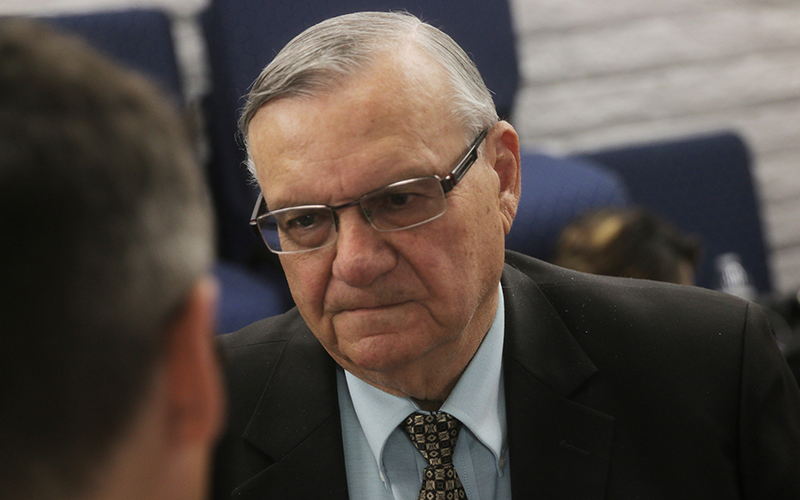WASHINGTON – The Supreme Court on Monday refused to hear Maricopa County’s claim that it should not be held liable for the actions of former Sheriff Joe Arpaio in a racial profiling lawsuit.
The high court, without comment, let stand a 2018 ruling by the 9th U.S. Circuit Court of Appeals that said “when Arpaio adopted the racially discriminatory traffic-stop policies at issue, he acted as a final policymaker for the county,” which made the county responsible for his policies.
Those policies included “routinely” targeting Latino drivers for traffic stops as a pretext to finding undocumented immigrants, the circuit court said.
“In short, Maricopa County is liable for violations of Title VI and (section) 12601 stemming from its own official policies,” 9th Circuit Judge Paul Watford wrote in the May 2018 ruling that the county unsuccessfully appealed.
Calls to the county attorney’s and county sheriff’s offices were referred to the overall county government, which declined comment Monday. Calls to the Justice Department seeking comment were not immediately returned, and Latino advocacy groups did not respond to calls on the ruling Monday.
The county liability case dates back to 2015, a sideshow of a longer-running court challenge to the policy of racial profiling of drivers by sheriff’s deputies under Arpaio.
In 2013, U.S. District Judge G. Murray Snow ordered Arpaio and his department to stop detaining people merely because of their race, a tactic deputies used in hopes of finding people here illegally. Snow ordered the department to hold people only if they were suspected of committing a crime

Joe Arpaio, above, was Maricopa County sheriff for 24 years, before being ousted by current Sheriff Paul Penzone in 2016. (Photo by Bri Cossavella/Cronkite News)
“The idea that day laborers are usually unauthorized aliens is unsupported by any statistics presented at trial,” Snow wrote in his order. He added that the assumption “is typically compounded with an unconstitutional association between work status and race.”
But after Arpaio and his deputies continued the practice, leading to the sheriff being found guilty of criminal contempt of court in July 2017 by U.S. District Judge Susan Bolton.
“Not only did (Arpaio) abdicate responsibility, he announced to the world and to his subordinates that he was going to continue business as usual no matter who said otherwise,” Bolton wrote in her order.
The conviction did not last long. In August 2017, President Donald Trump pardoned Arpaio.
“Throughout his time as Sheriff, Arpaio continued his life’s work of protecting the public from the scourges of crime and illegal immigration,” a White House statement on the pardon said. “Sheriff Joe Arpaio is now 85 years old, and after more than 50 years of admirable service to our Nation, he is worthy candidate for a Presidential pardon.”
Following his pardon, Arpaio mounted an unsuccessful bid for Senate, losing a three-way GOP primary to Kelli Ward and current Sen. Martha McSally, R-Arizona.
While Arpaio’s lawsuits were working through the courts, the county was trying to extricate itself from the case, saying it should not share the blame for the sheriff’s policies.
The county argued that “when a sheriff in Arizona adopts policies relating to law-enforcement matters, such as the traffic-stop policies at issue here, he does not act as a policymaker for the county,” according to court documents. It said that Arpaio was instead a policymaker for his own office and the county should not, therefore, have been held liable for his actions.
A district court rejected the county’s argument in 2015, and the circuit court upheld that decision last year. Watford, writing for the circuit court, dismissed the county’s argument, pointing to the Arizona Constitution, which states that sheriffs and other officials are elected “in and for each organized county of the state.”
Watbford added that that Constitution lets the county board of supervisors hold elected officials accountable and “may remove an officer who neglects or refuses” to issue reports on their duties.
